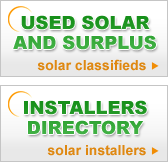Solar renewable certificates – New Jersey Board of Public
Utilities:
-This program tracks and verifies solar certificates, and allows
the certificates to be sold on-line to electric suppliers to meet
suppliers' solar renewable portfolio standard requirements.
-Solar renewable certificates are bundled in denominations of one
megawatt-hour of solar energy production at minimum.
-Participants must register with the New Jersey Board of Public Utilities
in order to play a part in this program.
Property tax exemption for renewable energy systems:
-The total value added by renewable energy systems used to generate
heat, cooling or other energy needs are exempt from local property
taxes.
-Renewable energy systems and technologies that are eligible for this
exempt include; solar photovoltaics, solar water heat, solar space
heat, solar thermal, wind energy, biomass, hydroelectric, geothermal,
heat pumps, etc.
Solar energy sales tax exemption:
-All solar energy equipment in New Jersey is exempt from sales tax.
-Passive solar design equipment is also exempt.
Sited renewable energy rebates:
-This rebate program is provided to customers who use the following
energy efficiency technologies: Photovoltaic systems, fuel cells,
small wind-energy systems and biomass energy technologies.
-The rebates vary open the type and size of the system. Financial
incentives range from $0.15 - $4.00 per watt DC. Wind incentives are
determined by expected performance.
-Systems must include a five year warranty or more.
-Energy output from a system should not be more than 100% of the expected
consumption
Solar loan program – Public Service Electric and Gas:
-Public Service Electric and Gas provides loans to customers with
photovoltaic systems.
-Loans will cover 40-60% of the cost of the PV system. The remainder
of the cost is financed by the customer.
-Residential customers receive loans at a 6.5% interest rate with
a 10 year payback period.
Net Metering:
-Systems eligible for net metering in New Jersey are those that generate
electricity using solar, wind, geothermal, wave, tidal, landfill gas
or sustainable biomass resources, including fuel cells.
-Individual system’s maximum capacity is 2 megawatts.
-The net excess generation is given to the customer at the utilities
retail rate as a credit on the customer’s next bill. Any remaining
net excess generation is credited at the avoided-cost of wholesale
power at the end of an annualized period.
-Customer’s may sale and purchase net excess generation by entering
into a bilateral agreement with their electric supplier or service
provider.
-Customers retain ownership of all renewable-energy credits associated
with their generated electricity.
-Qualifying systems must meet all efficiency requirements.
- Customers with photovoltaic systems have the option to participate
in New Jersey's Solar Renewable Energy Certificates program by applying
to the New Jersey Board of Public Utilities.
Residential renewable energy tax credit:
-This personal tax credit allows the taxpayer to claim a credit of
30% of expenditures including labor costs and installation of qualified
residential solar-electric systems, solar water heating systems or
fuel cells. Small wind-energy systems and geothermal heat pumps can
also be accredited for.
-Solar-electric systems and solar water heaters have a maximum incentive
of $2,000 if placed in service before 2009. There is no maximum incentive
for systems placed after 2008.
-The excess amount of the federal tax credit may be carried forward
to the next taxable year if it exceeds tax liability.
-This can be carried forward until 2016, but after that, it is unknown
if the unused credit will be able to be forwarded.
Residential energy conservation subsidy exclusion:
-This is a personal exemption of 100% of energy conservation subsidies
provided by public utilities.
-The value of a purchase or installation of any energy conservation
measure by a customer such as solar water heat, solar space heat or
photovoltaics will not be included in the customer’s gross income.
-Customers of an electric utility company, who participate in the
utility’s energy conservation program, may receive a rate reduction
of electricity furnished or a nonrefundable credit against the purchase
price of the electricity on each monthly electric bill.
Energy-efficient mortgages:
-This is a federal loan program where homeowners can use EEM (energy-efficient
mortgages) to finance renewable energy technologies in a home.









